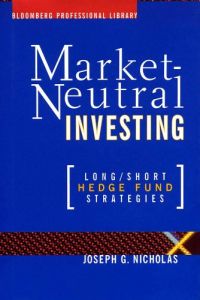Join getAbstract to access the summary!

Join getAbstract to access the summary!
Joseph G. Nicholas
Market-Neutral Investing
Long/Short Hedge Fund Strategies
Bloomberg Press, 2000
What's inside?
If you think that hedge fund strategy is too esoteric for a simple guy like you, consider this: The collapse of a single fund — Long-Term Capital Markets — shook the global market to its very foundation.
Recommendation
Joseph G. Nicholas’ thorough breakdown of market-neutral investing reveals some common threads and some striking differences between the most common strategies. Most of these strategies, some of which are based on newly developed financial instruments, are not available to average investors or even to many mutual fund managers. Instead, they serve as tools for money managers at the world’s largest institutions. Nicholas uses mostly non-technical language and defines all important terms in a glossary, so that even a lay reader can understand. He also keeps math to a minimum. As a result, his book makes the seemingly dry realm of hedge fund investment techniques interesting and accessible while delving deeply into each strategy’s approach to risk and reward. getAbstract.com recommends this book to money managers, finance professionals and investors considering a hedge fund investment. But in light of the role that these strategies played in the collapse of former world-beater, Long-Term Capital Management, any student or professional would benefit from gaining at least a cursory notion of how they work - or don’t work.
Summary
About the Author
Joseph G. Nicholas is an expert on alternative investment strategies. He is the founder and chairman of Hedge Fund Research LLP, an investment advisory firm, and Hedge Fund Research Inc., a supplier of hedge fund data. He co-founded the Zurich HFR Index Funds. He is the author of Investing in Hedge Funds: Strategies for the New Marketplace.




















Comment on this summary